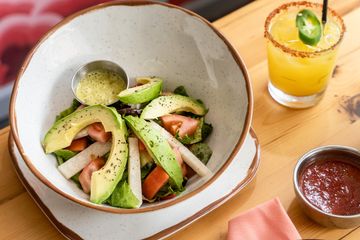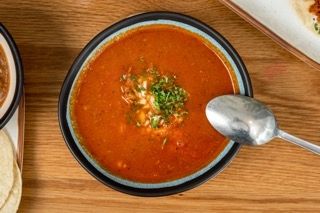Is Mexican Food Healthy? Unboxing the Nutritional Perks of Traditional Components
The concern of whether Mexican food is healthy and balanced invites an exploration of its traditional active ingredients. Beans and corn work as foundational staples, abundant in protein and fiber. Avocados offer useful fats, while different herbs and flavors add taste and health and wellness benefits - take out and delivery. With each other, these components produce a tapestry of nourishment. The healthiness of Mexican food commonly depends on prep work techniques and portion dimensions. What role do these aspects play in establishing its overall nutritional worth?
The Power of Beans: Protein and Fiber-Rich Staples
Often ignored, beans serve as a foundation of Mexican cuisine, providing a wealth of nutritional advantages. Rich in protein, they are an excellent plant-based alternative for those looking for to fulfill their dietary healthy protein requires. This high healthy protein content sustains muscular tissue repair service and growth, making beans important for both vegetarians and meat-eaters alike. Additionally, beans are an exceptional source of nutritional fiber, which aids in food digestion and promotes a sensation of volume, possibly assisting with weight administration.
The range of beans used in Mexican dishes, such as black beans, pinto beans, and kidney beans, adds to a diverse flavor profile and can boost dishes nutritionally. Additionally, beans are reduced in fat and include essential minerals and vitamins, including folate, iron, and magnesium. With each other, these qualities make beans an essential active ingredient, delivering both sustenance and food in standard Mexican price.

Corn: a Versatile Grain With Nutritional Conveniences
Corn stands out as a versatile grain essential to Mexican food, commemorated not only for its cooking applications yet additionally for its outstanding nutritional profile. As a key ingredient in recipes like tortillas, tamales, and pozole, corn gives crucial nutrients that add to a balanced diet. Rich in carbs, it functions as a substantial power resource, while also being low in fat, making it a favorable choice for numerous nutritional needs.
In addition, corn is a great resource of dietary fiber, which aids in food digestion and promotes satiation. It consists of significant quantities of vitamins such as B-complex vitamins, which are essential for basal metabolism. The existence of antioxidants, specifically carotenoids, contributes to general wellness by minimizing oxidative stress. Additionally, corn is gluten-free, accommodating those with gluten sensitivities. Overall, the nutritional benefits of corn underscore its value in standard Mexican food and its duty in a healthy diet plan.
Avocados: Healthy Fats and Nutrients in Every Bite
Avocados play a substantial role in Mexican food, complementing meals with their velvety appearance and rich taste. Beyond their cooking charm, avocados are celebrated for their remarkable dietary profile. They are an abundant source of healthy monounsaturated fats, which can aid reduced poor cholesterol levels and support heart wellness. In addition, avocados are packed with essential nutrients, consisting of potassium, vitamin E, and B vitamins, contributing to total health.
The high fiber content in avocados help food digestion and promotes satiety, making them an advantageous enhancement to any dish. Their special nutrient make-up can likewise support skin health and supply anti-inflammatory advantages. Incorporating avocados right into traditional Mexican dishes or appreciating them as a standalone snack can boost both taste and nourishment, showing why they are a precious staple in Mexican cuisine. Overall, avocados use a tasty means to enjoy healthy fats and important nutrients in every bite.

Natural Herbs and seasonings: Flavorful Wellness Boosters
While enjoying the abundant flavors of Mexican food, one can not neglect the vital role that spices and natural herbs play in improving both preference and health. Ingredients such as oregano, chili, and cilantro peppers not only contribute to the dynamic taste profile however also supply substantial health advantages. japanese steakhouse near me Cilantro is known for its cleansing homes, helping to eliminate hefty steels from the body, while oregano is packed with anti-oxidants and possesses anti-inflammatory results.
Chili peppers, a staple in several Mexican recipes, consist of capsaicin, which read more has been linked to enhanced metabolism and discomfort alleviation. Furthermore, flavors like cumin and coriander support digestion and might assist in blood glucose policy. Integrating these tasty wellness boosters into dishes not just improves the cooking experience but additionally promotes total well-being, making Mexican food not simply scrumptious, however additionally nutritionally helpful.
Conventional Cooking Techniques: Enhancing Nourishment and Flavor
Conventional food preparation approaches in Mexican food play a vital function in improving both nutrition and taste, as they often focus on fresh active ingredients and classic strategies. Strategies such as nixtamalization, where corn is saturated and cooked in an alkaline remedy, not just improve the nutrient profile of tortillas yet additionally enhance their digestibility - tacos. Additionally, the use of sluggish food preparation methods, like stewing or braising, enables tastes to blend perfectly while retaining the honesty of the ingredients

Frequently Asked Questions
Are Mexican Food Portions Typically Larger Than Various Other Foods?
Mexican food portions are commonly larger than those of lots of various other cuisines. This characteristic mirrors conventional dining practices, emphasizing communal sharing and hearty dishes, which can lead to a much more significant serving dimension generally.
Exactly how Does the Preparation Technique Affect Healthiness of Mexican Food?
Preparation approaches greatly affect the healthfulness of Mexican food. Strategies such as barbecuing or steaming maintain nutrients, while frying can boost undesirable fat web content. Choices of active ingredients and cooking designs inevitably identify total nutritional value.
Can Mexican Food Be Tailored for Specific Dietary Restrictions?
Mexican from this source food can without a doubt be tailored for specific nutritional restrictions. Alternatives, such as making use of corn tortillas for gluten-free diets or integrating even more vegetables, make it possible for individuals to delight in traditional flavors while suiting different nutritional needs.
What Are Typical Mistaken Beliefs About Mexican Food and Wellness?
Usual false impressions concerning Mexican food consist of the belief that it is naturally unhealthy, overly spicy, and exclusively concentrated on fats. In truth, standard recipes frequently feature nutritious components and can be tailored to various nutritional demands.
Exist Healthier Alternatives at Mexican Dining Establishments?
Healthier options at Mexican restaurants frequently consist of barbequed meats, beans, and fresh veggies. Choosing dishes that emphasize whole ingredients and staying clear of heavy sauces can bring about a much more nutritious dining experience, advertising overall wellness.
The variety of beans utilized in Mexican dishes, such as black beans, pinto beans, and kidney beans, contributes to a varied taste profile and can improve meals nutritionally. Avocados play a substantial function in Mexican food, complementing dishes with their velvety appearance and rich taste. Integrating avocados right into traditional Mexican recipes or appreciating them as a standalone treat can enhance both taste and nutrition, demonstrating why they are a precious staple in Mexican food. While delighting in the abundant flavors of Mexican food, one can not neglect the necessary role that spices and herbs play in improving both preference and wellness. Conventional cooking methods in Mexican food play a necessary duty in boosting both nourishment and taste, as they typically prioritize classic techniques and fresh components.